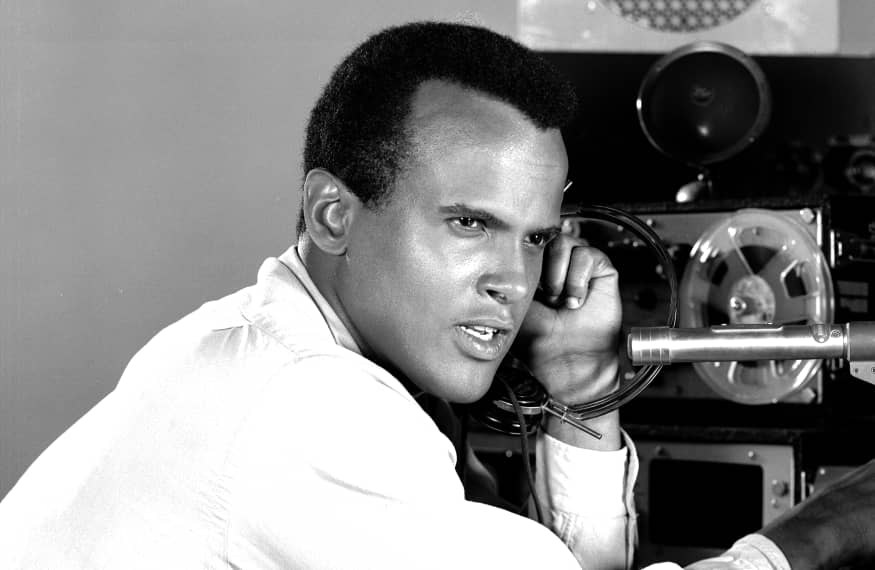
I woke up today to discover that YouTube had posted a 1988 concert in Germany, by Harry Belafonte. Of course, the live recording opened with his eternally-beloved song, Day-o! I sang along, and watched as he performed with the backup singers, and the tight, professional performance of his musicians: drummer, percussionist, the saxophonist, guitarists, bass, rythm and lead. The entire ensemble was as professional as could have been expected.
It was reading the comments that alerted me to why the posting was done. Harry Belafonte had died, a few days ago! He passed on Tuesday, 25th April. He was 96. Yes, 96! And how did I miss the news of his passing?
I am very sure most of my readers would squeeze their furrows and ask who on earth was Harry Belafonte? And they would be right to ask. For most of the population of our country, and indeed the world, given the structure of our population today, and the types of popular music they now consume, won’t know who he was, what he did, why he was a great artist, and a very progressive individual; or why he should be celebrated. But we must celebrate a true icon of the world of popular music, of the very troubled 20th Century.
Harry Belafonte was not only a very successful artist, and he truly was. He nevertheless was a man of tremendous courage, who used the popularity that he enjoyed, to speak for the most progressive causes of his era. The Civil Rights movement of the 1950s and the 1960s in the USA very much defined an era, and it also coincided, or more appropriately, was part of a worldwide ferment, against the injustices of colonialism in Africa, and for the human dignity of the African-American people, in the most inhumane imperialist country in human history, the United States of America.
Harry Belafonte was inspired by the African-American icon, singer, great athlete, political thinker, irrepresible defender of the working people of the world, and anti-imperialist, Paul Robeson. It was therefore not a surprise, that, literally, standing on the shoulders of that great man, Belafonte went even farther, to assist the remarkable civil rights project of that epoch, becoming one of the closest confidants of Martin Luther King.
But it was not only in the African-American struggle that he made his mark. No. He was a friend and mentor to Miriam Makeba, Mama Africa, soon after she went into exile, from apartheid South Africa. He used his considerable prestige and influence, to assist Makeba and other exiled artists from apartheid, to find a foothold in the American popular music scene.
The struggles of Africans was very close to his heart, and Nelson Mandela’s imprisonment became a constant point of reference in his art and political life, till Mandela was freed, and South Africa defeated apartheid. Similarly, most people might not even know that he was a main influence behind the United Artists for Africa’s very successful “WE ARE THE WORLD” song, that was used to raise funds for the famine emergency in the Horn of Africa, during the 1980s.
Harry Belafonte was a friend of the great actor, Sidney Poitier, he collaborated with another great musician Nat King Cole, and he was actually the artist that popularised calypso music to international audiences from the 1950s. This was in fact reflective of his origins. He was born in America, but had roots in Jamaica and the Caribbean, in general. He took the rythyms of his origins, retained the pains, longings, and the struggle for life of his communities, in the Caribbean, in the USA, and by extension, in Africa, and used the art to speak to the world.
Every song in his rich ouevre spoke to the realities of life, and have become part of the eternal ensemble of the spiritual heritage of mankind: Day-O ( the Banana Boat Song); Island in the Sun; Jamaica Farewell; Jump in the line; Mary’s Boy Child; Coconut Song; Booboo Day; and so many more. His CDs are always in my vehicles, and even the youngest of my kids, has grown to love Harry Belafonte’s music. That’s how much we adore him in my family. And his autobiography, “My Song”, is equally a most juicy book to read.
I just read on Wikipedia, that Belafonte won three Grammy Awards, including a Grammy Lifetime Achievement Award; an Emmy Award; a Tony Award; in 1989, he was given the Kenedy Centre Honours; Belafonte was given the National Medal of Arts in 1994; and just last year, 2022, he was inducted into the Rock and Roll Hall of Fame, in the Early Influence category.
His very long life, was eminently productive, and he lived to the ripe old age of 96 years. That life was long enough for him to see the success of some of the major social issues that he committed his time and resources to, in a very crowded and activist life. For example, African-Americans made some remarkable strides, even when there’s still the issue of institutionslised racism, and a prison industrial complex, that disproportionately imprisons more Black people, than any other American community. But he has also seen the remarkable response encapsulated in BLACK LIVES MATTER; apartheid was defeated in South Africa, amongst several others.
So if you’ve never heard of Harry Belafonte, do yourself the favour of going online today, to enjoy his remarkable music, and just fancy how he used art, to serve very socially-relevant causes. Harry Belafonte was indeed a truly remarkable figure who played a progressive role in the struggle for human emancipation. Harry Belafonte, thanks a lot for the joy that you brought to millions of people around the world.
Dr. Is’haq Modibbo Kawu, PhD, FNGE, is a Broadcaster, Journalist and Political Scientist .
Abuja, Friday, April 28th, 2023.

